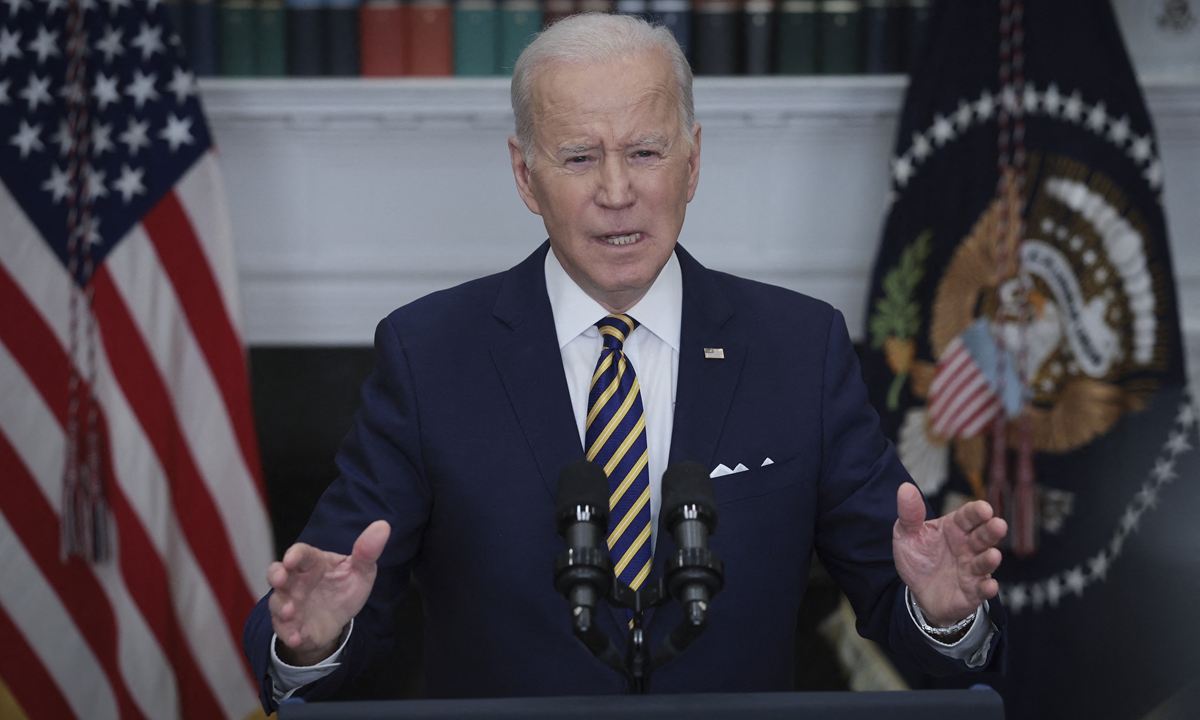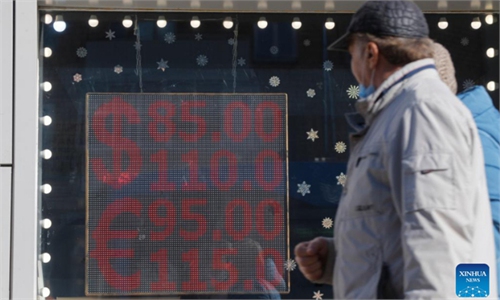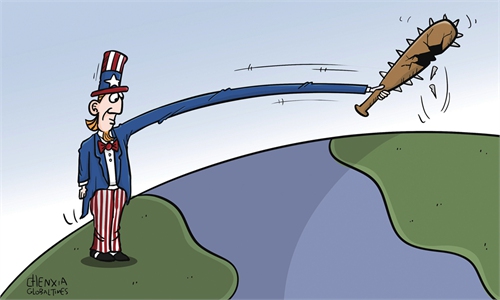Europe needs to sharpen eyes to see through US' 'tearjerker': Global Times editorial

US President Joe Biden announced a full ban on imports of Russian oil and energy products on March 8, 2022. Photo: AFP
Click here to stay tuned with our live updates on Ukraine tensions.On Tuesday local time, US President Joe Biden announced a ban on Russian oil, liquefied natural gas, and coal imports. This is so far the toughest sanctions launched by the US and its allies against Russia. It targets the main artery of Russia's economy and aims to "inflict further pain on Putin." Biden added that there will be costs as well in the US. But it is generally believed that people in Europe will mainly be the ones suffering from the pain and costs caused by these sanctions.
Data show that around 45 percent of the EU's natural gas came from Russia in 2021, and Russia is also Europe's largest oil supplier. Data from the ICE Stock Exchange in London show that gas futures prices in Europe on Monday rose by more than 50% and exceeded $3,500 per 1000 cubic meters. In contrast, the US does not import any Russian gas at all, and only eight percent of its oil and oil products come from Russia. However, US media plays along with Washington and claims these sanctions will result in price increases in the US. This is a "tearjerker" Washington has put on for Europe.
Inflation in the US had already been a very serious problem long before the Ukraine crisis. Even if Washington did not sanction Moscow, oil prices would still rise in the US. This is mostly the result of the failure of the US economic structure. But Washington wants to use this chance to pose as a mournful "pioneer," hypocritically pretending that "I will fight alone if you have difficulties," and the ultimate goal is to persuade European countries to follow it and ban Russian energy imports together. Washington is well aware that only if Europe joins will its goal of "striking the artery of Russia's economy" be possible to realize.
For Washington, this is a good deal. But Europe will have to pay a really heavy price. Germany has made it clear that it doesn't plan to join any ban. German Chancellor Olaf Scholz said on Monday that "at the moment, Europe's supply of energy for heat generation, mobility, power supply, and industry cannot be secured in any other way." French President Emmanuel Macron also stated bluntly in a statement that the US is not dependent on Russian oil and gas, but Europe is. Therefore, some netizens have commented that Washington is trying to "kill" the EU and disguise it as a "mass suicide."
The US is fanning the flames with coercive measures to form a "circle" to sanction Russia, in a bid to maximize the effects of squeezing Russia with geopolitical approach. But the truth is, even within the trans-Atlantic alliance, different sides' real requests and attitudes are not as unanimous as they appear. It is impossible that the US can reach consensus. Washington also demanded non-Western countries to follow its commands. This is even more arrogant and overbearing. As Pakistani Prime Minister Imran Khan asked, "Are we your slaves?"
Europe is facing the most serious crisis since the end of World War II. The process to address the crisis and its final end is directly linked to Europe's future: Will the continent completely become a strategic vassal of Washington? Or will it become one respectable polar in the multipolar world? The result depends on what Europe chooses to do. Europe has been promoting strategic autonomy in recent years, the agenda of which is deeply jeopardized by the Ukraine crisis. If Europe becomes severely divided, it will be more dependent on the US for security. This will inevitably cost Europe its autonomy.
Ironically, shortly before the US announced its energy ban, a high-level US delegation was sent to Venezuela to discuss the possibility of removing energy sanctions on this Latin American country. Venezuela has been an important target of US heavy sanctions - and the two countries cut their diplomatic ties in 2019. Nevertheless, to sustain sanctions on Russia, the US is considering cutting loose Venezuela. This again shows the US sanctions have been running out of options.
Russia and Ukraine are negotiating, and there are sporadic signs of easing of the situation. But Washington is eager to put off that positive light and spares no efforts to escalate the crisis to a new height. This is about nothing but interests. Washington has been striving to convince and rope in Europe to its side, because the latter is the most useful weapon for the US. If Washington wants to "defeat Moscow," it must use and sacrifice Europe. Perhaps the US always needs a war. But is that the case for Europe?
The Russia-Ukraine crisis provoked the nerves of ordinary European people, who have become more worried about security. Washington is clearly taking advantage of such sentiment to intensify the crisis. But history has repeatedly proven that maximum sanction can never really solve problem. It will not bring peace and security, but will only cause severe difficulties to the economy and people's livelihood for the related countries, even trigger geopolitical turbulence. May Europe sharpen its eyes.


